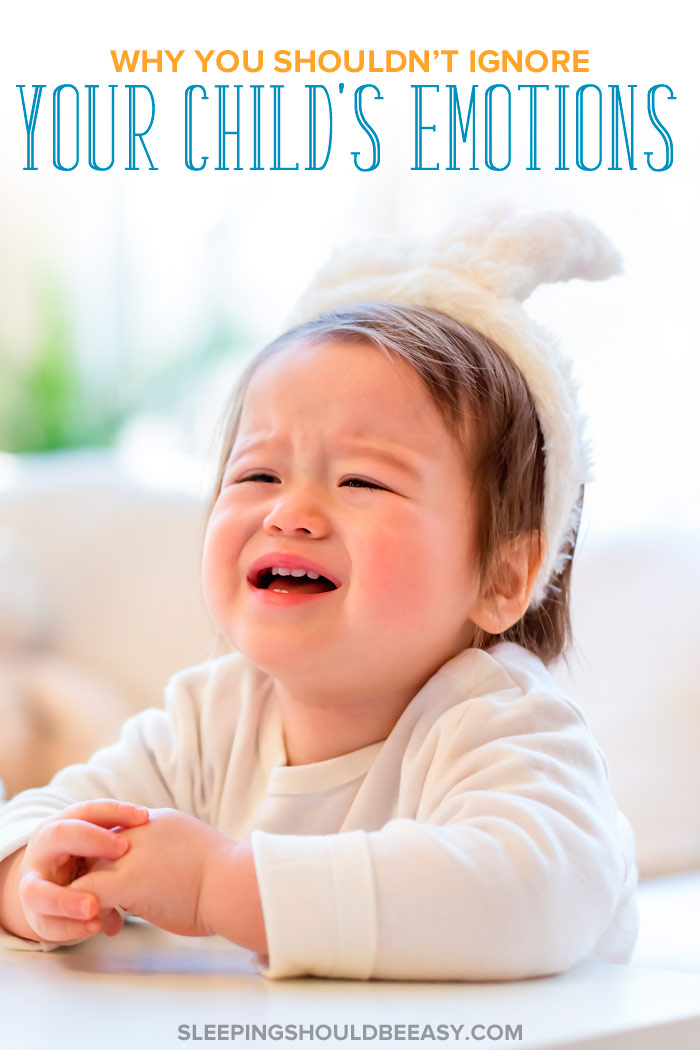Why You Shouldn’t Ignore Your Child’s Emotions
How often do we reassure young children by saying “It’s okay”? We want them to feel better, but here’s why you shouldn’t ignore your child’s emotions.
 It’s so easy to say “It’s okay” and dismiss children’s emotions. We often do so to soothe them after they fall and get hurt, or we say it to reassure their emotions. It might be a fear of sand, uncertainty about a new environment, or a scuffle with another kid.
It’s so easy to say “It’s okay” and dismiss children’s emotions. We often do so to soothe them after they fall and get hurt, or we say it to reassure their emotions. It might be a fear of sand, uncertainty about a new environment, or a scuffle with another kid.
Saying “It’s okay” seems like the right thing to say to erase their hurt and frustration. We might hug them tight in our arms and whisper, “It’s okay, it’s okay.” In less patient times, you might be irritated with your child’s behavior and brush his emotions aside with a curt “It’s okay!”
But the emotions are real to them, as real as our own emotions are to us. They may not be ready to be rid of them just yet or can’t turn them off as quickly as we think they could. They feel all the emotions we do but don’t understand or communicate them as well.
The next time your child goes through difficult emotions, even if it’s negative behavior, acknowledge how he feels. In doing so, you give him many opportunities to define his big feelings and reap benefits like:
Table of Contents
1. A chance to sort through feelings
Imagine you got in a fight with a friend, and so many emotions are swirling inside you. You’re jealous of her new success. You feel rejected. You’re anxious about how to proceed with your friendship.
So, you turn to your spouse to sort your emotions, hoping he can provide a listening ear to your troubles. But instead, he immediately says, “It’s okay, I’m sure it’ll turn out fine.” In your mind, it’s not okay. You’re far from feeling the least bit okay.
When we tell our kids “It’s okay,” we don’t show empathy or offer guidance on how to discuss what they may be feeling. They still have too many emotions that we ignore by saying “It’s okay.”
Sorting through your child’s feelings validates that how he feels is normal. Whatever bad behavior he did is inappropriate, but the feelings behind them are legitimate. This helps him identify and cope through them in the future.
Free resources: Exhausted from losing your cool so often? Even if it seems like you’ve tried just about everything, you can stop losing your temper, if you start from the inside out and change from within.
In How to Finally Stop Losing Your Temper, you can learn how to reflect on your habits and triggers, and what to do when you feel that rush of anger. Join my newsletter and grab your PDF below—at no cost to you:
2. Feeling respected
In addressing your child’s emotions, you’re saying that they are as valid as anyone else’s. He won’t feel belittled or small for being afraid of shadows or upset when another child takes a toy.
You may not show the same fears for shadows or anger over a child taking a toy, but these are real emotions he goes through. It’d be the same as someone not taking your fears or anger as valid reasons to feel upset.
And when you address his fears, don’t tease him with, “Are you being a scaredy cat?” This belittles his feelings and shows that you don’t take his emotions seriously.
3. A quicker way to reduce misbehavior
You might think that avoiding or brushing aside your child’s feelings is a quicker way to get him to stop “bugging” you about them. Instead, the opposite is true. The more you acknowledge his emotions, the quicker he can feel reassured.
Let’s say your child cries hysterically at bath time. Work around his fears. Set the faucet to a slow trickle instead of a steady downpour. Raise the temperature and use your hands instead of a washcloth. Don’t force him to take a bath if he’s truly upset.
This is especially useful in the long run. Sure, you might convince your child right now that his fear is no big deal, but that fear might continue to fester. If you help him cope with his emotions, he won’t continue to be afraid the next time he faces those triggers again.
Learn how to talk to your child about feelings.

Conclusion
As frustrating as it may be to deal with “petty” fears and emotions, not to mention temper tantrums and meltdowns, acknowledge them as genuine feelings your child needs to sort through.
Each time you do, you give him space to sort through his feelings and learn what they are. You’re also respecting him as you would another adult’s. And acknowledging his emotions is a quicker way to reduce difficult behavior than if you brushed them aside.
My son never did end up taking a stroll with me on the beach. The most daring he got was using his hands to play on the sand while he kept his feet safely tucked away on the blanket. And that’s fine. He knew his feelings were valid and that adults won’t just brush them aside with “It’s okay.”
Get more tips:
- How to Discipline a 1 Year Old (Especially When Yours Ignores You)
- On Accepting Your Children for Who They Are
- How to Handle a Threenager
- How to Deal with Public Tantrums
Don’t forget: Join my newsletter and grab How to Finally Stop Losing Your Temper below—at no cost to you:

